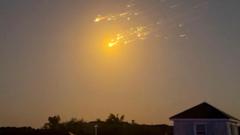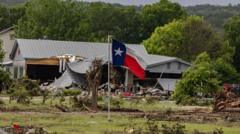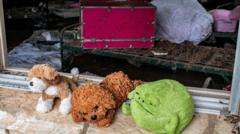SpaceX's latest Starship launch resulted in a catastrophic explosion shortly after liftoff in Texas, marking a second consecutive failure for the ambitious rocket. While no injuries were reported, the incident raised safety concerns and delayed flights across several Florida airports.
SpaceX's Starship Experiences Second Consecutive Launch Failure Due to Explosion

SpaceX's Starship Experiences Second Consecutive Launch Failure Due to Explosion
The giant rocket's recent test flight led to an explosive failure, causing debris to rain down over the Caribbean, prompting airspace delays.
A SpaceX Starship rocket met with disaster shortly after its launch from Texas on Thursday, as it exploded in mid-air, showering debris over Caribbean nations and prompting serious safety warnings. The incident has caused significant disruptions in air travel, with authorities halting flights at multiple airports in Florida out of precaution.
The massive Starship, which stands at 123 meters (403 feet), was part of its eighth test mission aimed at later deploying into Earth's orbit over the Indian Ocean. However, shortly after takeoff, the spacecraft experienced a "rapid unscheduled disassembly," resulting in the loss of communication with ground control as it spun precariously in the sky.
Fortunately, there were no reports of injuries or damage on the ground, despite eyewitness accounts from island residents capturing images of fiery debris billowing through the atmosphere. SpaceX confirmed that debris should have fallen in a designated area and emphasized that the spacecraft did not carry toxic materials.
The SpaceX flight's commentary stressed the company's commitment to coordinated efforts with safety officials following the explosion. In a public statement, they indicated a strong focus on analyzing data from the failed mission to refine Starship’s reliability moving forward. “Success comes from what we learn, and today’s flight will offer additional lessons,” the statement read.
This failure occurs against a backdrop of prior mishaps; the FAA had previously grounded Starship missions following a dramatic failure earlier this year, which had also caused property damage in the Turks and Caicos Islands. With the latest explosion occurring before the FAA had completed its investigation into the previous failure, the situation raises critical questions about regulatory practices surrounding SpaceX’s ambitious launch schedule.
The government of the Turks and Caicos Islands has since communicated with SpaceX and U.S. authorities on ensuring public safety. Meanwhile, the SpaceX team made it clear that they were prepared for such occurrences, utilizing accrued knowledge from the earlier launch failures.
As the world's most powerful rocket, Starship is an integral part of Elon Musk's vision for future Mars colonization and lunar missions alongside NASA’s Artemis program. Despite the setbacks, SpaceX vows to learn from each launch and continue its quest towards revolutionizing space travel.




















